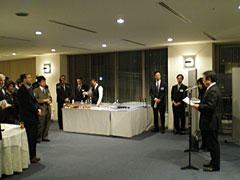Opening Remarks by Mr. Osamu Uno,
the Vice Minister for Foreign Affairs
at the Reception on the Occasion of G8 Health Experts' Meeting

14th February, 2008
Japanese
Distinguished Guests, Ladies and Gentlemen,
I would like to extend a warm welcome to all of you.
As you know, Japan will host two major international conferences this year, the Fourth Tokyo International Conference on African Development (TICAD IV) and the G8 Hokkaido Toyako Summit. We are now working hard to make these conferences successful.
'Development' and 'Africa' are important themes of both conferences. At the Davos Economic Forum, Prime Minister Fukuda stated that he intends "to focus on health, water, and education" at the G8 Hokkaido Toyako Summit from the perspective of 'Human Security.' Furthermore, Foreign Minister Koumura, in his policy speech on Global Health last November, proposed on the establishment of a 'common international framework for action.'
At this G8 Health Experts' Meeting, active discussions are being held not only among the representatives of G8 countries but also with the representatives of the H8, African Union and Norway. It is epoch-making and significant that the major donor countries, health-related agencies, and representatives of AU meet and discuss together. I heard that you have discussed about issues of health systems and maternal, new-born and child health during today's sessions, and tomorrow, you will discuss about infectious diseases. I have high expectations that the intensive discussions will contribute to the success of this year's G8 Summit.
If you look around the world, global health has been improving as a whole, thanks to the tireless efforts of all countries. However, the situation remains severe in and around Sub-Saharan Africa. In Sub-Saharan Africa, the under five mortality rate and maternal mortality ratio are still significantly high. Although medicine for HIV/AIDS now reaches wider population, the number of deaths caused by AIDS continues to grow in this region. The prevalence rate of tuberculosis has deteriorated compared to that of 1990 and the lack of health workers in the field also poses a serious challenge. In other parts of the world such as Asia, health issues like HIV/AIDS, Tuberculosis and new-types of influenza are recognized as factors that might impede socioeconomic development of the region.
Japan has worked on the issues of Global Health - a challenge faced by all humanity - with strong interest and will. Japan launched the 'Okinawa Infectious Diseases Initiative' at the G8 Kyushu Okinawa Summit in 2000, which led to the establishment of the Global Fund to fight AIDS, Tuberculosis and Malaria. In 2005, Japan launched the 'Health and Development Initiative" and announced the comprehensive assistance of US$ 5 billion. Japan has been implementing this assistance steadily since then.
To tackle the Global Health issues, such as the achievement of MDGs, it is important that assistance reaches individuals and communities. At the same time, capacity development, including training of health workers, is crucial for assistance to be effective. These ideas concern 'Human Security', to which Japan attaches great importance. To further develop discussions based on these ideas, I would like to ask for the expertise of donor countries including G8, health agencies, AU, NGOs, and experts who have gathered here today. Japan will also continue to endeavor, drawing on its own experiences in tackling many health issues such as maternal and child health and tuberculosis.
Ladies and Gentlemen, now please allow me to propose a toast. To the success of the G8 Health Experts' Meeting, KANPAI!
Thank you.
Back to Index
